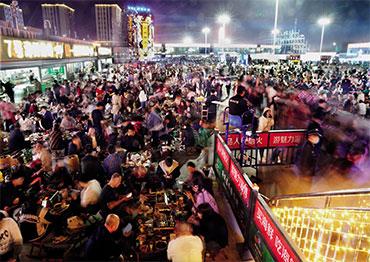Zibo’s success attracted government officials from other cities in Liaoning, Henan and Hebei provinces. “The popularity of Zibo barbecue shows that a city’s economic development does not depend on temporary tourist projects or promotion but a good combination of history, culture, goodwill and government efforts,” visiting officials from Nanyang, Henan Province summarized at a seminar.
Song Xiangqing, vice director of the school of government at Beijing Normal University, believes the Zibo phenomenon is typical in terms of city image promotion. “Many cities that have abandoned the old paths [of relying on resource-intensive industries] are anxious to find new ways out. Zibo set an example in making attempts based on its own characteristics,” said Song, who said Zibo should be an inspiration to other cities, particularly resource-based ones.
“The barbecue boom allows the world to see another side of Zibo – an improved living and business environment. Before, people would first think of chemicals, ceramics and [industrial] pollution,” commented a local economist who requested anonymity, adding that despite the sudden fame, Zibo still faces challenges in optimizing its economic structure.
The economist said Zibo’s economic structure is typical of Shandong, where traditional industries, focusing on chemicals and textiles, accounts for 70 percent of the industrial economy.
Zibo’s industrial history dates to the end of 19th century when mining, ceramics, glass and silk industries emerged. In the 1950s, Zibo attracted lots of investment and by the end of the 1980s, it had developed a comprehensive industrial base, boasting the biggest manufacturers for household ceramics and colored glaze. But the glory did not last. Since the end of the 1990s, when reforms and structural adjustments caused factories to close, the city declined.
The local economist noted that in the past 20 years Zibo has been trying to update its industries toward fields like biological medicine, information technology, high-end equipment and functional materials, with little effect.
The city already tried to leverage social media to improve its profile, hosting a music festival in 2020 and promoting its barbecue for the first time. But there was no deep exploration of local tourism potential. Now the city is considering how to associate barbecue with the culture of Qi, an ancient state that lasted from the mid-11th century-221 BCE, with Zibo as its capital.
Ren Yunpeng, director of Shandong University of Technology’s research center for ceramics and glazes, noted that tourist exploitation of Zibo’s ceramics history is in the early stages. “Compared to Jingdezhen [China’s porcelain center] in Jiangxi Province that has succeeded in using ceramic art to attract tourism, Zibo requires more time and talent to tap its resources.”
Other interviewed experts said that Zibo’s exploration of Qi culture is mainly on the academic level, suggesting more professionals are needed to integrate it closer with the culture and tourist industry.
“After the holiday, we’ll analyze how the popularity of barbecue has influenced the city. Then more energy will focus on how to continue the heat and how to leverage the popularity to motivate the city economy and the adjustment of industries,” a person close to the city government who requested anonymity told NewsChina.
Some worry that the allure is already fading, a common fate for hot social-media destinations. In June, wait times to get into the most popular restaurants are down to only 30 minutes.
Chen Yingjie is concerned about what to expect from the city next. He said that it is natural for the frenzy to cool down, but he hopes it will be gradual so as not to shock local barbecue businesses.
In any event, the city is revived. “Barbecue is just a small business. But taking the chance, Zibo manages to boost its image. It’s better than sitting by and watching the city stagnate in recession,” Chen said.

 Old Version
Old Version

